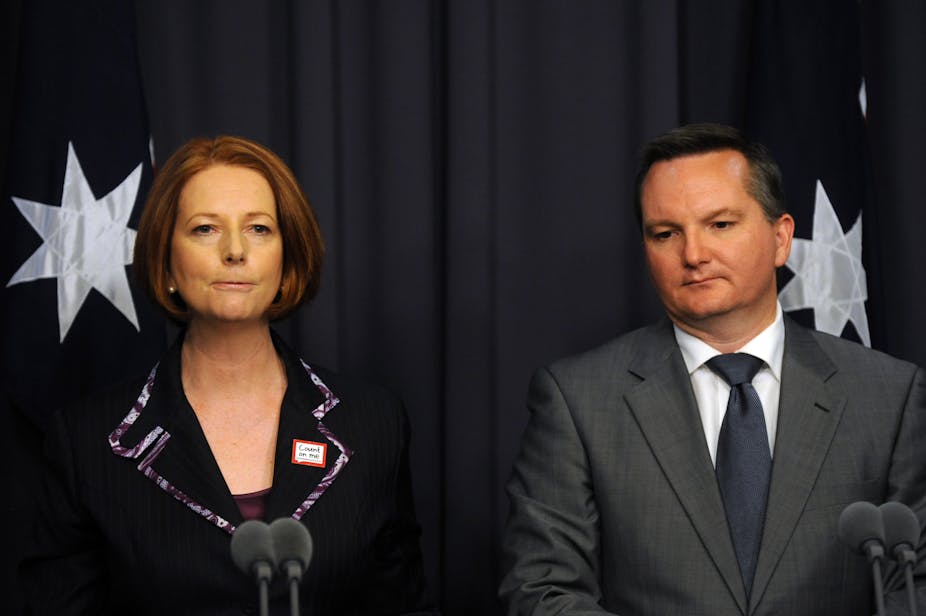The Malaysia Solution isn’t quite dead, but its vital signs are certainly not good. With a steely look in her eye, and barely concealed anger, Julia Gillard blamed Opposition Leader Tony Abbott for “trashing the national interest” in refusing to vote for her government’s amendments to the Migration Act. Without those changes, the processing of asylum seekers will now be done onshore in Australia.
Of the cross-bench MPs, only Rob Oakeshott and Tony Windsor indicated they were willing to support the government. The Western Australian National MP Tony Crook dealt the fatal blow. After saying he was in principle willing to support offshore processing of asylum seekers, he turned his back on the Prime Minister, citing doubts over a lack of humanitarian protection in the Malaysia Solution.
Bad tempered politics
There had been a brief window of potential opportunity for Labor to introduce the bill, when indiscipline from Liberal frontbencher Sophie Mirabella saw her barred from Parliament for 24 hours, for defying the rulings of Deputy Speaker Peter Slipper. But the Government decided not to take advantage of Mirabella’s temporary absence. Instead, the ALP locked themselves in a caucus meeting before agreeing to abandon the vote today, but leave the bill on the books, ready for resuscitation.
The Opposition is accusing the government of political cowardice and mendacity, and of being too scared to lose the vote.
The Migration Act amendments would have never passed the Senate anyway, given the balance of power held there by the Greens.
Effectively withdrawing the bill has allowed Labor to avoid the first defeat in a House of Representatives vote by any Government in over 80 years. The last administration to face this ignominy was the Bruce-Page Coalition Government in 1929.
What now for asylum seekers?
The High Court ruling that offshore processing for asylum seekers is unlawful still stands. Sending people to Malaysia or re-establishing the Manus Island processing centre in Papua New Guinea is no-longer an option.
All asylum seeker claims will therefore continue to be processed in Australia for the intermediate future.
This running political sore for the Government will thus continue to be exploited by the Opposition, which insists the Government returns to the Howard Government’s “Pacific Solution”, of sending asylum seekers to Nauru, although the legality, as well as the ultimate effectiveness of this option is now in doubt.
Labor’s Caucus is set to remain troubled by the issue, as the Left faction remains highly uncomfortable with offshore processing, which has long been criticised by human rights lawyers and activists, as well as the Greens.
Labor recovery?
All this comes just a day after the administration scored its most significant policy victory of this parliament when the Carbon Tax legislation was passed in the House of Representatives.
Despite the setback on the Migration Act amendments, could the Carbon Tax’s almost guaranteed passage through the Senate, be a political catalyst for Labor’s electoral recovery? It’s the greatest policy reform finally achieved so far by the Government.
Labor has to start turning around its woeful performance in the polls, if there is even to be the faintest chance of re-election in 2013.
There had been a slight recovery in both Labor’s primary vote and two-party preferred vote in recent polling, although this has proved to be temporary. The gap in the polls is still huge, and probably insurmountable for Labor. It currently ranges from 57.3%-42.7%.
Carbon tax
Once the carbon tax fully passes into law, and is implemented from mid-2012, the Government hopes the negative campaign by the Opposition and the various anti-carbon tax lobby groups will lose its impetus.
Tony Abbott will hardly relent on the carbon tax though, as he has invested so much political capital in opposing it.
Repealing it is sure to be the Coalition’s core campaign policy for the next election.
To distract from this, Labor will be hoping that by the 2013 election, the Australian economy will still enjoy relative economic prosperity, driven by the ongoing commodities boom. They can’t rely on this though, with growing concerns over a “hard landing” in China. Debt and inflation are growing there thanks to China’s overheated property market, potentially sparking a slowdown in China’s economy. This could easily plunge a fragile international economy back into global recession.
Election chances
And that’s before you take into account the problem right on Julia Gillard’s front door - the underlying leadership tensions in Labor. Kevin Rudd’s prominent presence will continue to be stoked and exploited by the Opposition.
If Labor can overcome the potential stumbling block of Andrew Wilkie’s pokie reform legislation by May 2012, its minority Government would still be likely to survive a full term, to an election likely to be held sometime in August-October 2013.
But unless there is a dramatic improvement in the polls for Labor by then, it remains highly unlikely Julia Gillard will lead Labor to the next election.
Abbott government
While a lot can happen in politics over the next two years, Tony Abbott is likely to take the top job at the next election.
Should he become Prime Minister though, his stated “pledge in blood” to repeal the carbon tax will be far harder to achieve in reality, if the Greens retain the balance of power in the Senate, which is likely.
A double dissolution election, with a subsequent repeal of the carbon tax, would be possible by 2015 at the earliest.
Business will generally be opposed to the economic disruption and uncertainty that repealing the carbon tax would bring.
And the Coalition would have the political challenge of withdrawing at least $15.3 billion in the compensation measures associated with the carbon tax – which include extensive income tax cuts, increases to pensions and welfare payments, and subsidies and support to industry.
The vociferous political debate over the carbon tax is set to continue for a long while.
And after her long week in politics, Julia Gillard isn’t going to find life easier anytime soon.

